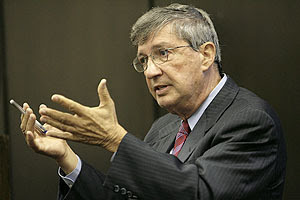This proverb is the first of a set of three that runs through verse 14. The general theme concerns the integrity of government, while the middle proverb, verse 13, deals with the obvious fact that both ruler and ruled are equal in the sight of God. There is also a progression among the three verses from negative to positive, passing through the neutrality of verse 13. One can also see that wicked officials who become oppressors of the poor meet their match in a ruler who leads with integrity and truth.
Our concern, however, is with verse 12 specifically. A little understanding of the way a royal court works—in fact, any seat of leadership—will help explain how this happens. If the ruler bends an ear to gossip, insinuations, misrepresentations, unfounded assertions, manufactured "facts," or any other kind of falsehood, his administration will be founded on sand. His advisors and officials will soon learn that the easiest way to influence and power in the government is by telling the ruler what he wants to hear rather than what is actually true. That is how the game is played. In a very short time, the whole government will be corrupt. In other words, the underlings adjust themselves to their leader, and thus the Roman saying, Qualis rex, talis grex (“like king, like people”).
The New King James translates this verse as a conditional statement: "If ... [then]." However, the Hebrew makes a plain statement of fact, as the Contemporary English Version renders it: “A ruler who listens to lies will have corrupt officials.” Wherever they are found, hierarchies have this property: The whole governmental structure reflects that character—or lack thereof—of the leader at the top. As American philosopher Ralph Waldo Emerson puts it, "Every institution is but the lengthened shadow of some great man." This can be a wonderful asset when the man at the top possesses sterling character—and a terrible liability when he is corrupt, out of his depth, or a fool.
Parents need to be especially careful because of this fact of human nature. The children will not only reflect that attitudes, speech, and behaviors of their parents, but they will actively learn how to function under their parents leadership and manipulate them to get what they want. And this happens much earlier in the children's lives than most parents realize; toddlers may not be able to articulate what they are doing, but they know when tears or smiles or some other trick will make mom or dad do their bidding. Many a mother has told a friend about an incident with her child, "The baby was just so cute that I had to give in!" The baby had won and learned how to make the mother dance to his/her tune.
The overall lesson is that a person in authority must lead by seeking the truth in all matters that come before him. It is foolish to decide a matter based on initial reports or only one side of a dispute, even if it sounds right. He should not act before taking the time and the effort to discover independently whether matters are as they have been presented. If a leader takes this prudent path, those under him will soon learn that it does not pay to tell falsehoods that will be found out, leading to their ouster. In an atmosphere of truth, corruption finds it much harder to gain a foothold, and everyone under such an administration of integrity has a greater opportunity to be satisfied.
